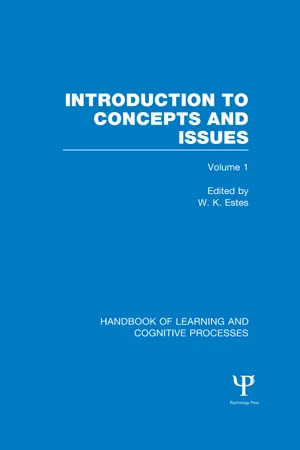Comparison of Approaches Psychology
The comparison of approaches in psychology involves evaluating different theoretical perspectives and methodologies used to understand human behavior and mental processes. Key approaches include behaviorism, psychoanalysis, cognitive psychology, humanistic psychology, and biological psychology. Each approach offers unique insights into the complexities of the human mind and behavior, contributing to a comprehensive understanding of psychological phenomena.
7 Key excerpts on "Comparison of Approaches Psychology"
- eBook - ePub
- Ian Fairholm(Author)
- 2012(Publication Date)
- Bloomsbury Academic(Publisher)
...Similarly, contemporary psychology is as diverse and eclectic as ever, and many psychologists seek to combine or take elements from more than one approach. Therefore, when I write about these different psychological approaches and where they position themselves on a particular issue or debate, I am obviously referring to general trends and skimming over individual differences that might exist within a given approach. Bearing all of that in mind, you’ll find a summary of the five approaches in the ‘In summary box 1 ’. In summary box 1 Behaviourist approach: ▪ Focus on learning and observable behaviour and how this is shaped by the environment ▪ Main strengths: defines psychological concepts using standardised, objectively defined terminology ▪ Main weaknesses: limited scope and subject matter; more interested in behaviour than the mind ▪ Favoured method(s) of study: experiments with animals and humans ▪ Nomothetic approach Biological approach: ▪ Focus on how the functions and structures of the brain and nervous system create, influence and interact with our psychological states ▪ Main strengths: links psychological concepts to those of the more well-established science of biology ▪ Main weaknesses: danger that psychological concepts are reduced to the level of biological ones (see Chapter 8) ▪ Favoured method(s) of study: experiments with animals and humans, some cases studies ▪ Nomothetic approach Cognitive...
- eBook - ePub
Handbook of Learning and Cognitive Processes (Volume 1)
Introduction to Concepts and Issues
- W. Estes(Author)
- 2014(Publication Date)
- Psychology Press(Publisher)
...4 Comparative Psychology and Human Cognition Douglas Medin Michael Cole Rockefeller University One of the strange aspects of writing an article advocating comparative research on human cognition in the latter quarter of the twentieth century is that the idea is at least a century old. Darwin’s famous study of the expression of emotions in man was but one of many essays in comparative psychology in the last century. In the current century there have been several attempts to incorporate comparative research into the main body of psychological theory (Werner, 1948). Generally, however, these attempts were not particularly influential, mainly, in our opinion, because neither cognitive theories nor comparative research strategies had evolved to the point where there was a strong basis for positive interaction between the two. In this presentation we would like to consider the theoretical and practical advantages to be gained from the inclusion of a wide range of subject populations and behaviors in a general psychology of human cognition. Our goal is to provide a framework for evaluating and integrating data gathered from diverse subject populations. We hope to demonstrate that this framework can be useful to the comparative researcher interested in the basis of group differences and can be relevant to understanding cognitive processes independent of any special interest in comparative enterprises. The domain of comparative research in this article is intended to include at least phylogenetic, developmental, and cross-cultural comparisons because we believe that there is a logic to the comparative approach that is basically similar, regardless of whether we are looking at comparisons across cultures, across species, or across ages within a species...
- eBook - ePub
- (Author)
- 2012(Publication Date)
- Wiley(Publisher)
...Comparative psychology fits within the broad field of animal behavior studies, which includes research by scientists from many disciplines. The title zoological psychology may be a better one for the field because it highlights the connection of comparative psychology with zoology—especially so-called whole-animal biology (Kline, 1904). Much research within comparative psychology includes no overt comparisons among species. The goals are to develop a complete understanding of general principles governing mind and behavior, including its origins (evolutionary, genetic, and developmental), control (internal and external), and consequences (for the individual, the surrounding environment, and for subsequent evolution). Overt comparison is but one method of reaching such understanding. Comparative psychologists take seriously the effects of behavior on differential reproduction and, ultimately, evolutionary change. Comparative psychology may be regarded as that part of the field of animal psychology, the psychology of nonhuman animals, not included within either physiological psychology or process-oriented learning studies. Such research generally is conducted on either species or behavioral patterns not generally utilized in those fields. In this chapter, I trace the history of comparative psychology from early cave paintings to the present. This entails first a consideration of the British forerunners of comparative psychology and the emergence of the field in the United States prior to World War I. This was followed by a postwar period of decline, as younger comparative psychologists were unable to sustain careers, and then by a resurgence of activity between the world wars. The field has remained active since World War II and has been strongly influenced by developments around the world and in European ethology, sociobiology, and cognitive science...
- Nancy Fenton, Jessica Flitter(Authors)
- 2015(Publication Date)
- Research & Education Association(Publisher)
...Chapter 3 History and Approaches Psychology is the scientific study of the behavior and mental processes of humans and animals. Behavior is defined as any action that may be observed and measured, and mental processes include cognitions, sensations, perceptions, and emotions. As a science, psychology seeks to use empirical methods to observe, measure, predict, explain, and positively influence behavior. Some psychologists focus on the biology of behavior and mental processes, such as the influences of nerve cells, genetics, or hormones. Other psychologists study complex social behaviors, such as aggression, attraction, and prejudice. There are many varied approaches to the study of psychology, making it a rich and complex field. Early Influences on Psychology Since the beginning of thought, humans have asked psychological questions, such as: How do we experience the world around us? What is the relationship between the way that we experience the world and how our bodies function; for example, why does food lose its flavor when we are sick? How do we learn, and what accounts for differences in behavior and temperament among people? Greek Philosophy The science of psychology, like physics, chemistry, and biology, developed from philosophy. Historians trace psychology’s beginnings to the philosophers of ancient Greece. Ancient Greek philosophers observed and interpreted their environment and organized their findings, forming the basis for empirical investigation in psychology. These philosophers were the first Europeans to reason that human beings have, in addition to a physical body, an apparatus used for thinking. Philosophers called this thinking apparatus the psyche or mind...
- Dominic Upton(Author)
- 2013(Publication Date)
- Routledge(Publisher)
...Although there may be several different theories within each approach, they will all share some common underlying assumptions. Unfortunately (or fortunately depending on your perspective), there are several different approaches in psychology. There are many reasons for this; first, it is because all psychologists enjoy the experience of arguing and debating with one another. Second, there is no real agreed position, and there may be several factors that influence the way we behave – there is no conclusive evidence for any one of the approaches. However, the final and most important reason for different approaches existing is that our behaviour is determined by several factors: for example our genetic endowment, physiological processes, personal characteristics such as intelligence, personality and psychopathology, the environment, specific stimuli and cognitive processes such as perception, thoughts, and memories. Think about this Why do people act in this way: yawn eat too much drink alcohol are short tempered don’t follow your advice get depressed have phobias about spiders, needles or uniforms? The idea that there are various explanations for human behaviour can be illustrated by taking a concrete example. For example, most people now agree that substance abuse and substance dependence are determined by a range of factors: ‘a multiply determined phenomenon’ (Lowe, 1995; Sanson et al., 2011). Think about this Think about all the factors associated with substance misuse. List them all. Is there any way you can group them into different themes? (As a clue, what about social, biological and so on?) When we have listed all the factors associated with substance misuse we may come up with variables such as social factors (e.g. stressful living conditions or unemployment) or you may suggest some biological factors (such as the genes the individual inherited from their parents) (Anderson and Teicher, 2009)...
- eBook - ePub
Psychology in Historical Context
Theories and Debates
- Richard Gross(Author)
- 2017(Publication Date)
- Routledge(Publisher)
...Those discussed in this chapter certainly don’t exhaust all major schools; only brief mention has been made of psychodynamic approaches (see Chapter 9), the relatively recent Evolutionary Psychology (see Chapter 8), and Humanistic Psychology (see Chapter 10). The very existence of such a variety of ways of trying to capture the nature of ‘human psychology’ is likely to reflect the inherent complexity of that psychology; however, as we shall see in Chapter 2, there may be no way of pinning it down to see it for what it ‘really’ is, only theoretical views of what it might be. Pause for thought – answers 1 Other theoretical perspectives or ways of accounting for phenomena. These represent different levels of explanation, each of which, according to anti-reductionists, is valid in its own right. (See Chapter 2 for a discussion of reductionism.) 2 Probably the most widely used application is behaviour therapy as a major tool in Clinical Psychology. Linked to this, classical conditioning is a major account of how phobias are learned, and, to a lesser extent, posttraumatic stress disorder (PTSD) (see Gross, 2015). 3 Perhaps the bestknown example is Atkinson and Shiffrin’s (1968, 1971) multi-store model of memory (MSM) (see Chapter 7). The MSM emphasizes the role of rehearsal as a means of retaining information within the longterm store. There are plenty of other examples from both Cognitive and Social Psychology....
- eBook - ePub
Cognitive Psychology
An Overview for Cognitive Scientists
- Lawrence W. Barsalou(Author)
- 2014(Publication Date)
- Psychology Press(Publisher)
...Second, cognitive psychologists generally believe that internal constraints govern human information processing. To understand human information processing, researchers must assess the internal mechanisms that underlie it, and not simply examine observable stimulus-response pairs, as in behaviorism. Third, cognitive psychologists generally believe that cognitive constructs have scientific utility. By employing these constructs, cognitive psychologists can develop a powerful science: They can explain data from a wide variety of research, produce hypotheses to guide future research, and develop applications of social and technological value. Moreover, cognitive constructs contribute to the understanding of intelligence, because they provide an explanatory account of the mechanisms that produce it (1.2). Even though cognitive psychologists share fundamental assumptions, they nevertheless differ in their approaches, both methodologically and theoretically. In the following sections, I briefly characterize what I perceive as the dominant approaches, although other cognitive psychologists might characterize the field differently. Note that many researchers do not fit neatly into any particular approach and that many researchers straddle more than one. After presenting these approaches, I argue that they are neither mutually exclusive nor at odds with one another. Rather, these approaches are complementary, each playing a necessary role in the development of a strong science. 11.1 THE ECOLOGICAL APPROACH Proponents of the ecological approach argue that cognitive psychologists must understand the physical environment if they are to understand cognition (Gibson, 1950, 1966; Neisser, 1976, 1982, 1984; Neisser & E. Winograd, 1988). Because humans evolved on the Earth’s surface, their brains developed biological mechanisms to process information in this environment that is essential to surviving in it...






